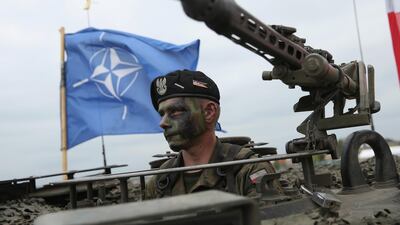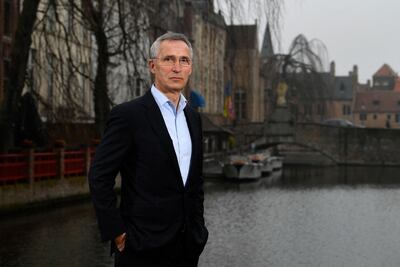The European Union cannot defend Europe on its own, Nato Secretary General Jens Stoltenberg said amid calls for the bloc to develop "strategic autonomy" from major allies such as the US.
The EU does not have an army of its own, but the European Commission is seeking a more self-determining “geopolitical role”, with the power to follow its own foreign and defence industry policies independently of Nato.
French President Emmanuel Macron previously called Nato – a military alliance between 30 European and North American countries – "brain dead" and irrelevant in the post-Cold War world.
During the bloc’s fractured relationship with the US under Donald Trump's administration, Mr Macron also led calls for a European army to protect the continent from adversaries.
But Mr Stoltenberg said Europe's defence depended on close transatlantic bonds and not on a quest for autonomy.
"I support EU efforts on defence, because more defence spending, new military capabilities and addressing the fragmentation of the European defence industry – all of that will be good for European security, for transatlantic security, for all of us," he told AFP.
"So all these efforts – as long as they complement Nato – we welcome them, but the EU cannot defend Europe.
"More than 90 per cent of the people in the European Union, they live in a Nato country, but only 20 per cent of Nato's defence spending comes from Nato EU members.”
Mr Trump repeatedly accused some European countries of not pulling their weight, and Mr Macron in turn accused Nato of failing to adapt to Europe's security priorities.
There were also tensions between European capitals and Nato member Turkey, which is accused of breaking a UN arms embargo on Libya and trespassing in Greek waters in a search for gas reserves.
During this period, Britain, a major Nato member, left the EU, further tipping the balance of spending between EU and non-EU allies in the latter's favour.
This fuelled calls from some in Europe for the continent to chart its own path.
"I am a defender of European sovereignty, of strategic autonomy, not because I'm against Nato or because I doubt our American friends, but because I am lucid on the state of the world," Mr Macron told the Financial Times last month.
"Nobody can tell me that today's Nato is a structure that, in its foundations, is still pertinent. It was founded to face down the Warsaw Pact. There is no more a Warsaw Pact.”
The Warsaw Pact was signed in 1955 to form a Soviet bloc counterpart to Nato, which was created six years earlier.
But Mr Stoltenberg said Nato still faced many other foes.
He cited Russia's encroachment on its neighbours, international terrorism, cyber attacks, the security effects of climate change, and the need to maintain an advantage over the rising power of China.
Former UK military envoy John Lorimer also told The National last month that Iran posed one of the greatest challenges for global security.
He said the country was strengthening its ballistic missile and drone armoury, accelerating its nuclear programme and conducting proxy wars as part of negotiation tactics.
Mr Stoltenberg said not “any country or any continent alone” could manage the present security challenges without help.
"I don't believe in Europe alone. I don't believe in North America alone. I believe in North America and Europe together in strategic solidarity in Nato," he said.
In geographic terms, he pointed out that the European Union's flanks are defended in the north Atlantic from Russian encroachment by non-EU members – the US, Canada and the UK.
In the south-east, non-EU member Turkey – often criticised as a threat to stability by Paris and Athens – borders Syria and Iraq and is "extremely important in the fight against [ISIS], international terrorism".
US President Joe Biden, expected to attend a Nato alliance leaders' summit later this year, is seen as wanting to keep pushing European members to meet their defence spending commitments – as Mr Trump did.
Mr Biden told the Munich Security Conference last month that the US in partnership with countries around the world was the best way to meet shared challenges.


